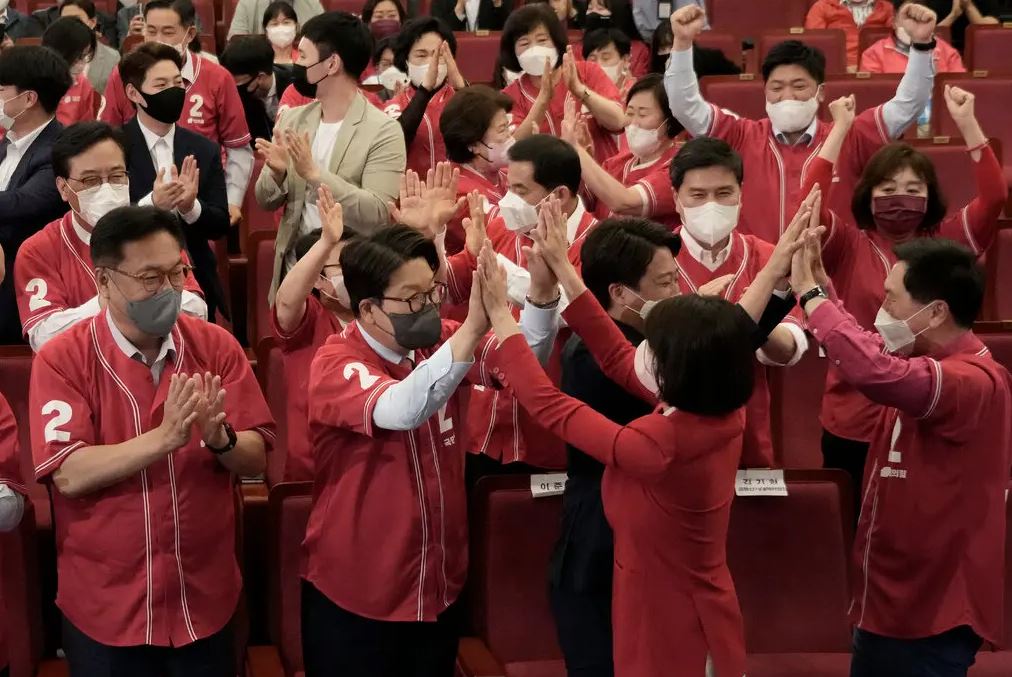Local elections were conducted in South Korea on Wednesday. The ruling party of President Yoon Suk-yeol won 12 of the 17 contests for big-city mayors and province governors, significantly increasing Mr. Yoon’s conservative dominance less than three months after he won the presidential election.
Oh Se-hoon, a candidate for Mr. Yoon’s People Power Party, often known as the P.P.P., emerged victorious in the campaign for mayor of Seoul, the nation’s capital. In addition, the P.P.P. was victorious in 11 additional elections for mayors and governors, one of which was for the position of mayor of Busan, which is the second-largest city in the nation after Seoul.
The opposition Democratic Party was victorious in five elections, with three of the victories coming from Jeolla in the southwest, which is the party’s traditional stronghold. Additionally, its candidates were victorious in the campaigns for governor on the island of Jeju in the south and in Gyeonggi-do, a large province that surrounds the capital city of Seoul.
The Democratic Party suffered a humiliating defeat as a direct consequence of the election’s outcomes. It won 14 of the same 17 contests for mayor of major cities and provincial governments in the most recent local elections, which took place four years ago. In the legislative elections held in 2020, it likewise won by an overwhelming margin.
The same voter anger that helped propel Mr. Yoon to victory in the March election helped propel him to the president. However, the Democratic Party continues to have a majority in the National Assembly, whereas Mr. Yoon’s party does not have a majority in that body.
In the elections that took place this week, which came quickly on the heels of the presidential contest and were seen as an extension of it, pre-election polls had anticipated a significant victory for candidates running under the P.P.P. banner. During the campaigns for mayor and governor, many of the same problems that were front and centre during the campaign for president came up again and again as major talking points.
Mr. Moon and his Democratic Party have placed a significant amount of emphasis on the pursuit of peace and communication with North Korea. Mr. Moon has had three separate encounters with the leader of North Korea, Kim Jong-un, and has been instrumental in arranging summit talks between Mr. Kim and President Donald J. Trump. But neither Mr. Moon nor Mr. Trump were able to eliminate any of the nuclear weapons that North Korea has before leaving office.
During the course of his campaign, Mr. Yoon gave notice that there would be a change in South Korea’s policy on North Korea. He placed a strong emphasis on maintaining sanctions and increasing South Korea’s military deterrent against the North. While he was in Seoul last month, he had a meeting with President Biden, and at that meeting, the two leaders decided to talk about extending their joint military exercises. They also pledged to increase commercial and technical links, which would push global firms located in South Korea, such as Samsung, further into the efforts that the United States government is doing to safeguard a vulnerable supply chain in the midst of escalating tensions with China.
Both the relocation of the presidential office to Seoul and the passage of a new budget measure to assist proprietors of small businesses that were severely affected by the epidemic are examples of Mr. Yoon’s early policy initiatives. He transformed the ancient Blue House, which had been closed to the general public for the prior seven decades, into a park for the benefit of the general populace. However, he has also experienced failure; two of the cabinet members he initially appointed have resigned after claims of unethical behaviour.
In addition, legislative by-elections were conducted in South Korea on Wednesday to replace seven seats in the National Assembly that had been left empty. Lee Jae-myung, a leader of the Democratic Party who ran for president but lost to Mr. Yoon in March’s election, and Ahn Cheol-soo, an entrepreneur turned politician who withdrew from the presidential race this year to endorse Mr. Yoon, were the two candidates who sought the presidency. Mr. Yoon was elected. Both Mr. Lee and Mr. Ahn were successful in winning seats in the legislature.
Additionally, hundreds of low-level local administration positions were filled as a result of the elections held on Wednesday. According to the findings of the National Election Commission, the PPP was victorious in the majority of those contests as well.

